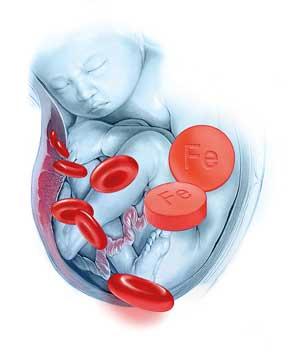Reply To:
Name - Reply Comment
 Pregnancy is a period during which your body undergoes a great many changes and demands special attention.
Pregnancy is a period during which your body undergoes a great many changes and demands special attention.
One of the key nutritional requirements during pregnancy is iron which is essential to produce red blood cells. Failure to meet this requirement can result in low hemoglobin levels in your blood, which is referred to as ‘Iron Deficiency Anemia’.
Some facts about iron deficiency
Iron deficiency anemia is the commonest nutritional deficiency among pregnant women in the world and is a major global healthcare issue. In our country it is estimated that around 20% of pregnant women suffer from this condition.
This can commonly occur due to an inadequate amount of iron rich food in your diet,because of low absorption of iron from your gut or when there are previous blood losses that deplete the iron stores in your body. It can also occur if the pregnant mother is a teenager or if she is pregnant after giving birth to her previous child less than one year ago.
Risks
Anemia during pregnancy can result in many risks to both the mother and the baby. It can disturb the normal growth of the baby, increase the chances of a premature delivery and result in low birth weight. It can also increase the risks of bleeding and infection of mother during and after the delivery of the baby. The baby can also have inadequate iron stores in the body. Mothers with anemia are also more prone to have depression in the weeks following the delivery. More severe cases of anemia in pregnancy can produce many non-specific symptoms to the mother such as tiredness, breathlessness, headaches, dizziness, palpitations, and sometimeseven heart failure.
In order to prevent these nasty outcomes of iron deficiency anemia, it is very important to ensure that your body receives satisfactory amounts of iron. Therefore it is of paramount importance to diagnose and promptly treat anaemia.
During pregnancy
If you are planning to conceive in the coming years, you can optimise the body iron stores by consuming iron rich food, and correcting any already existing deficiencies. If you are already pregnant, one thing you can do is to consume a balanced diet with food rich in iron. Red meat, fish, poultry and dried sprats are foods which have an easily absorbable iron sub type called haem-iron. Germinating cereals, green leaves and lentils contain substantial amounts of non-heam iron which is not as easily absorbed as haem-iron. Having vitamin C rich food or drinks such as orange or lime juice along with the iron rich food can help your body to absorb iron more efficiently.
Guidelines
To supplement the dietary iron intake, the already existing health guidelines enable Sri Lankan pregnant women receive iron tablets free of charge from the registered maternity clinic, beginning from their second trimester of pregnancy (12 weeks of pregnancy). This is given combined with folic acid supplements throughout the pregnancy. Iron supplement has a strength of 200mg and should be taken orally once daily. Along with this you will receive several other supplementary tablets such as folic acid, vitamin C and calcium. It is very important to time the intake of these tablets so as to get the maximum benefit out of them. If you take the iron tablet along with the calcium tablets or with meals, the amount of iron absorbed to your body will be less. On the other hand, iron and vitamin C tablets taken simultaneously will increase the absorption of iron. Therefore, take the iron tablet with the vitamin C tablet either1 hour before a meal or 2 hours after a meal. Take the calcium tablets after a meal at a different time of the day.
What reduces the absorption of iron?
In addition to this, tea, coffee and dairy products can reduce the iron absorption in the gut. Therefore it is important to avoid having these within an hour before and after the consumption of iron rich meals and iron tablets. Several medicines such as antacids taken for heartburn can also affect the iron absorption. If you are on such medicines, it is better to be reviewed by a doctor. The iron tablets should be stored in a dry, dark, airtight container to preserve their effects.
The oral iron tablets may sometimes cause a few troublesome side effects such as nausea, bloating, constipation and stomach aches. It is important to get this reviewed by a doctor to make changes if they are intolerable, instead of stopping the tablets on your own.
The field MOH clinic where you get registered will check your blood for the hemoglobin level in your first visit and at 28 weeks of pregnancy. This will detect if you are having anemia and the doctors will make changes to your treatment accordingly. This can range from increasing the dose of iron tablets to injecting iron preparations or blood transfusions.
As the saying goes, “Prevention is better than cure”. If you or a loved one of yours are expecting to be blessed with the beauty of motherhood, do not let the iron stores be exhausted, so that both the mother and the baby have a safe passage through the time of pregnancy.
(Research Assistant – Department of Obstetrics and Gynaecology
Faculty of Medicine – University of Colombo)